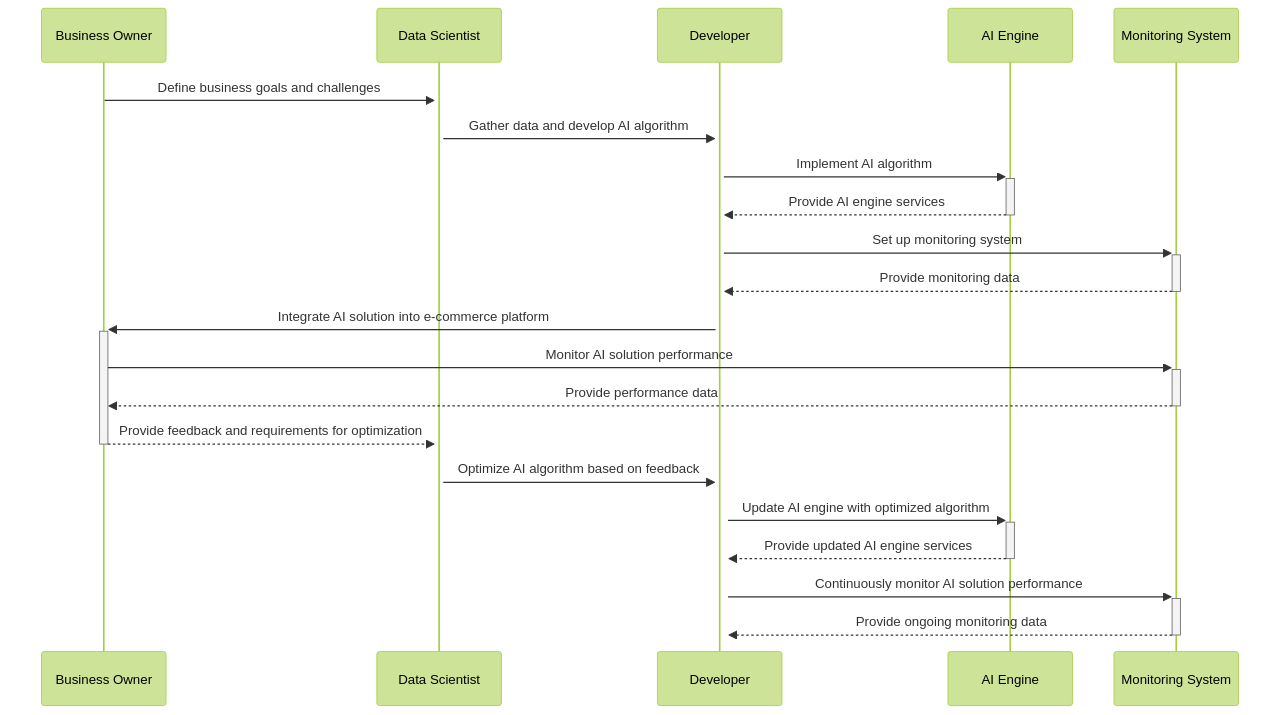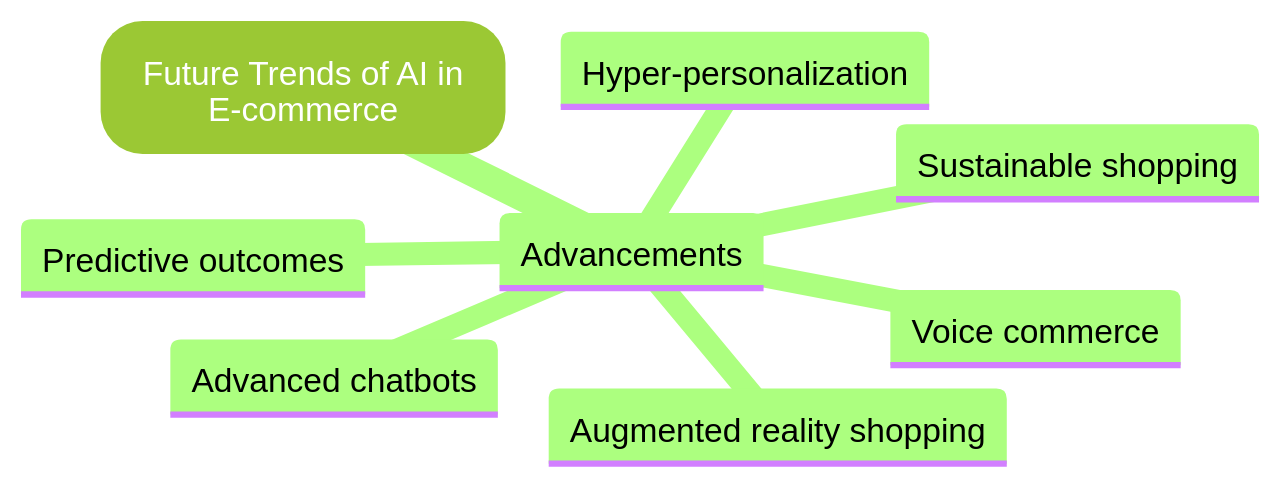Introduction
Artificial Intelligence (AI) is revolutionizing the e-commerce industry, transforming the way businesses interact with customers and operate their platforms. AI-powered solutions are enhancing customer experiences, optimizing operations, and driving revenue growth. From personalized product recommendations to streamlined inventory management, AI is reshaping the e-commerce landscape.
In this article, we will explore the role of AI in e-commerce, its key benefits, successful case studies, and future trends. We will examine real-world examples of how companies like Proton and Zara have leveraged AI to improve customer satisfaction, increase revenue, and stay competitive. Additionally, we will provide a step-by-step guide to building custom AI solutions for e-commerce ventures in 2024. Join us as we dive into the world of AI and its transformative impact on the e-commerce industry.
1. Understanding the Role of AI in E-commerce
Artificial Intelligence (AI) has been a game-changer in the realm of e-commerce, offering a new dimension to customer interaction and business operations. It equips e-commerce platforms with the ability to customize shopping experiences, streamline processes, and leverage data for decision-making. For instance, Proton, an AI-powered platform, has been a powerful tool in providing personalized product recommendations, enhancing customer service, and refining marketing strategies.
A practical example is of a lawn and garden parts distributor who, despite having a sizable workforce and substantial annual revenue, was facing challenges in product discoverability and personalization. With the integration of Proton's AI capabilities, the company saw a significant revenue increase. The AI platform was able to analyze sales data and predict customer behavior, leading to customers spending more on average. Moreover, customers who received AI-based product recommendations placed more orders, resulting in a noteworthy difference in revenue per customer.
Moreover, the AI enhancements of Proton are projected to generate a significant revenue increase in the coming year, demonstrating the potential impact of AI on passive channels like inbound telesales and counter orders. Companies like Reladyne and MSC have experienced similar successes, with substantial increases in e-commerce portal usage and call center upsell revenue, respectively.
Shifting the focus to Zara, the international fashion retailer, it has integrated AI throughout its supply chain and inventory management systems. The strategic use of AI has led to improved customer satisfaction and loyalty, and impressive rankings in global online fashion sales. By utilizing technologies like RFID tagging, real-time analytics, and machine learning, Zara has managed to substantially reduce its turnaround time for new designs.
AI's impact goes beyond automation of routine tasks to providing actionable insights through data analysis.

This leads to improved customer service, personalized product recommendations, and optimized marketing campaigns. The success stories of Proton and Zara underscore the vast potential and diverse applications of AI in e-commerce.
2. Key Benefits of Implementing Custom AI Solutions in E-commerce
Tailored AI solutions are revolutionizing the e-commerce landscape, transforming ordinary online stores into dynamic, customer-centric platforms. By leveraging AI algorithms and machine learning techniques, these solutions are optimizing operations and enhancing customer experiences.

Consider the software developers, designers, and engineers at BestToolbars.net. They craft innovative, bespoke solutions to optimize business processes and enhance customer experiences. Their custom AI solutions range from AI-powered recommendation engines to personalized product recommendations, all designed to meet specific business requirements.
An application of these custom AI solutions can be seen in the case of a lawn and garden parts distributor. Using Proton's AI platform, the distributor's sales data was processed to provide personalized product recommendations. The results were significant; customers who received these AI-based recommendations placed larger and more frequent orders, leading to a 21% increase in revenue per customer.
To improve search functionality, BestToolbars.net's team of experts, including Oleg Grebenyuk (CEO), Nik Gavrilov (COO), Tom Straszewski (VP of Sales), and Chris Ashbaugh (Head of Product), provide insights on integrating AI technology into existing search functionality. This ensures that the search functionality delivers accurate and relevant results, enhancing user experience.
Custom AI solutions also boost operational efficiency by automating routine tasks. This reduces errors, speeds up processes, and facilitates data analysis, providing valuable insights to inform data-driven decisions. By integrating AI solutions into their teams, companies can quickly test hypotheses and align with market trends.
Accelerate your software development with BestToolbars' cost-effective and flexible AI solutions.
In essence, tailored AI solutions are not just about staying competitive but about transcending competition and delivering an unparalleled customer experience. They are a game-changer in the e-commerce industry, leading to increased efficiency, profitability, and growth.
3. Case Studies: Successful Implementation of AI in E-commerce
Artificial intelligence (AI) is a revolutionary tool that has significantly impacted the e-commerce industry. Its ability to offer personalized experiences to customers is reshaping the way businesses operate. For instance, Amazon, a global e-commerce leader, utilizes AI to deliver customized product suggestions that align with a customer's browsing history and purchasing behaviors.
Similarly, eBay employs AI to augment its search functionality, ensuring customers can effortlessly locate their desired products. The power of AI to manage large data sets has proven instrumental in sales analytics, enabling businesses to streamline their inventory management.
AI also plays a critical role in facilitating real-time customer interactions through chatbots and recommendation engines. These AI-based tools gather, analyze, and apply customer intelligence to respond to queries and suggest products, thereby enhancing the customer experience and boosting sales.
A prime example of AI implementation is seen in BestToolbars, a well-known provider of custom web and mobile app development solutions for e-commerce businesses. They have harnessed AI to provide a seamless way for businesses to introduce digital solutions for cashback, online coupons, deals, and price comparison services.
As we look to the future of e-commerce, it's clear that AI will play a pivotal role. By 2020, it's estimated that 60% of digital commerce organizations will employ AI to enhance customer satisfaction, reduce costs, and boost revenue.
Moreover, AI-driven advanced image recognition technology is allowing users to discover products by analyzing images for color, size, shape, and even text. This is evidence of AI's impact, not only on the present state of e-commerce, but also on its future trajectory.
4. Step-by-step Guide to Building Custom AI Solutions for E-commerce in 2024
Building a custom AI solution for your e-commerce venture is a multi-tiered endeavor. The journey begins with the precise articulation of your business goals and challenges. This stage involves a deep understanding of your target audience, the products or services you offer, and existing business pain points.
The subsequent step is an extensive exploration of your data, which can encompass diverse data types like customer information, sales metrics, and web traffic statistics. The insights derived from this data analysis can spotlight potential opportunities for AI integration.
The third stage is the actual crafting and development of your AI solution. This phase may involve developing AI models, which then need to be harmoniously integrated with your existing systems. Rigorous testing is also essential to ensure the models operate as intended.
The final stage involves the consistent monitoring and optimization of your AI solution. It is crucial to continually assess performance and make necessary adjustments to ensure the solution remains in alignment with your business objectives.
AI in e-commerce has the potential to revolutionize both the seller's operations and the buyer's experience. By leveraging AI, e-commerce platforms can personalize the shopping experience, provide 24/7 customer support through chatbots, optimize inventory management, and enhance search functionality. AI can also aid in fraud detection and enable predictive analytics, which can help retailers forecast trends and manage inventory more efficiently.
For instance, tools like Bodt offer AI chatbots that provide round-the-clock support, handle complex queries, track orders, and offer product recommendations. AI not only enhances customer interactions but also improves operational efficiency and reduces costs for businesses.
The future of AI in e-commerce is promising, with advancements such as hyper-personalization, voice commerce, augmented reality shopping, advanced chatbots, predictive outcomes, and sustainable shopping on the horizon.

The global artificial intelligence market is projected to reach $181.18 billion by 2030, up from $13.655 billion in 2022, underscoring the growing importance of AI in e-commerce.
5. Future Trends: How AI Will Shape the E-commerce Landscape Beyond 2024
The integration of Artificial Intelligence (AI) in the e-commerce industry is a testament to its transformative power, driving advancements that reshape customer experiences and optimize operational processes.
A key application of AI is the personalization of the shopping experience. AI algorithms analyze customer behavior, browsing history, and purchase patterns to generate product recommendations tailored to individual preferences, as indicated in the solution context. This personalization strategy, backed by AI, enhances customer engagement, drives conversion rates, and boosts sales.
AI's influence extends to customer service with AI-powered virtual assistants and chatbots available 24/7. These systems address customer queries, assist in product selection, and handle post-purchase concerns, fostering customer satisfaction and trust.
AI's role is also prominent in operational domains such as inventory management and data analysis. Predictive AI algorithms facilitate efficient inventory management by forecasting demand patterns. AI's capacity to detect fraud patterns and set dynamic pricing based on market trends and customer behavior is revolutionizing e-commerce operations.
AI's potential in e-commerce spans augmented reality shopping, advanced chatbots, voice commerce, and predictive outcomes.
Voice-activated shopping, for instance, allows users to make purchases using voice commands, offering a seamless and hands-free shopping experience.
A practical example of AI application is Bodt AI. They offer AI chatbots for continuous customer support, product recommendations, and cost-effective solutions. This showcases how AI can enhance customer interactions, improve operational efficiency, and reduce costs.
To conclude, the future of e-commerce is deeply intertwined with AI, with its potential to shape shopping experiences and drive operational efficiencies. Businesses that leverage the power of AI are better positioned to meet dynamic customer needs and stay competitive.
Conclusion
The main points discussed in this article revolve around the role of Artificial Intelligence (AI) in the e-commerce industry. AI has transformed the way businesses interact with customers and operate their platforms, offering personalized product recommendations, streamlined inventory management, and improved customer satisfaction. Real-world examples from companies like Proton and Zara demonstrate the significant impact of AI on revenue growth and customer loyalty.
The broader significance of these ideas lies in the potential for AI to revolutionize the e-commerce landscape. By leveraging AI algorithms and machine learning techniques, businesses can optimize their operations, enhance customer experiences, and drive growth. Custom AI solutions tailored to specific business requirements offer benefits such as personalized product recommendations, improved search functionality, and operational efficiency through automation.
To stay competitive in the ever-evolving e-commerce industry, businesses are encouraged to explore the possibilities of integrating AI into their platforms. By harnessing the power of AI, companies can enhance customer satisfaction, increase revenue, and achieve long-term success. Start now by partnering with experts like BestToolbars.net to build custom AI solutions that will transform your e-commerce venture.





